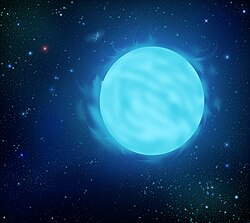Lista das estrelas mais massivas
Na lista abaixo, estão as estrelas mais massivas que se conhecem, ordenadas de acordo com sua massa, expressada em massas solares.
A massa estelar é o atributo mais importante da estrela. Junto com a composição química, a massa determina sua luminosidade, seu tamanho, e em última instância, seu destino.
Índice
1 Lista
1.1 Lista das estrelas mais massivas
2 Ver também
3 Referências
Lista |
Lista das estrelas mais massivas |

Estrela RMC 136a1

Eta Carinae

O aglomerado R136
| Nome | Massa ( Sol = 1) | Ref. |
|---|---|---|
RMC136a1 | 315 | [1] |
RMC136c | 230 | [1] |
BAT99-98 | 226 | [2] |
RMC136a2 | 195 | [1] |
Melnick 42 | 189 | [3] |
RMC136a3 | 180 | [1] |
Melnick 34 | 179 | [4] |
HD 15558 | >152 ± 51 | [5][6] |
VFTS 682 | 150 | [7] |
RMC136a6 | 150 | [1] |
LH 10-3209 | 140 | [8] |
NGC 3603-B | 132 ± 13 | [9] |
HD 269810 | 130 | [10] |
P871 | 130 | [8] |
WR 42e | 125–135 | [11] |
RMC136a4 | 124 | [1] |
Arches-F9 | 111–131 | [12] |
η Carinae | 120-(170-200) | [13] |
A1 em NGC 3603 | 114 + 84 | |
VV Cephei A | 100 | |
S Doradus | 100 | |
Pismis 24-1 | 100 | |
Cyg OB2-12 | 92 | |
WR 20a+b | 80+80 | |
R 66 | 70 | |
R 126 | 30 |
Ver também |
- Lista das maiores estrelas conhecidas
- Lista das estrelas mais luminosas
- Lista das estrelas mais brilhantes
Referências
↑ abcdef Crowther, Paul A.; Caballero-Nieves, S. M.; Bostroem, K. A.; Maíz Apellániz, J.; Schneider, F. R. N.; Walborn, N. R.; Angus, C. R.; Brott, I.; Bonanos, A.; De Koter, A.; De Mink, S. E.; Evans, C. J.; Gräfener, G.; Herrero, A.; Howarth, I. D.; Langer, N.; Lennon, D. J.; Puls, J.; Sana, H.; Vink, J. S. (2016). «The R136 star cluster dissected with Hubble Space Telescope/STIS. I. Far-ultraviolet spectroscopic census and the origin of He II λ1640 in young star clusters». Monthly Notices of the Royal Astronomical Society. 458. 624 páginas. Bibcode:2016MNRAS.458..624C. arXiv:1603.04994 . doi:10.1093/mnras/stw273
. doi:10.1093/mnras/stw273
↑ Hainich, R.; Rühling, U.; Todt, H.; Oskinova, L. M.; Liermann, A.; Gräfener, G.; Foellmi, C.; Schnurr, O.; Hamann, W. -R. (2014). «The Wolf–Rayet stars in the Large Magellanic Cloud». Astronomy & Astrophysics. 565: A27. Bibcode:2014A&A...565A..27H. arXiv:1401.5474 . doi:10.1051/0004-6361/201322696
. doi:10.1051/0004-6361/201322696
↑ Bestenlehner, J. M.; Gräfener, G.; Vink, J. S.; Najarro, F.; De Koter, A.; Sana, H.; Evans, C. J.; Crowther, P. A.; Hénault-Brunet, V.; Herrero, A.; Langer, N.; Schneider, F. R. N.; Simón-Díaz, S.; Taylor, W. D.; Walborn, N. R. (2014). «The VLT-FLAMES Tarantula Survey. XVII. Physical and wind properties of massive stars at the top of the main sequence». Astronomy & Astrophysics. 570: A38. Bibcode:2014A&A...570A..38B. doi:10.1051/0004-6361/201423643
↑ Portegies Zwart, Simon F.; Pooley, David; Lewin, Walter H. G. (2002). «A Dozen Colliding-Wind X-Ray Binaries in the Star Cluster R136 in the 30 Doradus Region». The Astrophysical Journal. 574 (2). 762 páginas. Bibcode:2002ApJ...574..762P. arXiv:astro-ph/0106109 . doi:10.1086/340996
. doi:10.1086/340996
↑ De Becker, M.; Rauw, G.; Manfroid, J.; Eenens, P. (2006). «Early-type stars in the young open cluster IC 1805». Astronomy and Astrophysics. 456 (3): 1121–1130. Bibcode:2006A&A...456.1121D. doi:10.1051/0004-6361:20065300
↑ Garmany, C. D.; Massey, P. (1981). «HD 15558 - an extremely luminous O-type binary star». Publications of the Astronomical Society of the Pacific. 93. 500 páginas. Bibcode:1981PASP...93..500G. doi:10.1086/130866
↑ Bestenlehner, J. M.; Vink, J. S.; Gräfener, G.; Najarro, F.; Evans, C. J.; Bastian, N.; Bonanos, A. Z.; Bressert, E.; Crowther, P. A.; Doran, E.; Friedrich, K.; Hénault-Brunet, V.; Herrero, A.; De Koter, A.; Langer, N.; Lennon, D. J.; Maíz Apellániz, J.; Sana, H.; Soszynski, I.; Taylor, W. D. (2011). «The VLT-FLAMES Tarantula Survey». Astronomy & Astrophysics. 530: L14. Bibcode:2011A&A...530L..14B. doi:10.1051/0004-6361/201117043
↑ ab Walborn, Nolan R.; Howarth, Ian D.; Lennon, Daniel J.; Massey, Philip; Oey, M. S.; Moffat, Anthony F. J.; Skalkowski, Gwen; Morrell, Nidia I.; Drissen, Laurent; Parker, Joel Wm. (2002). «A New Spectral Classification System for the Earliest O Stars: Definition of Type O2». The Astronomical Journal. 123 (5): 2754–2771. Bibcode:2002AJ....123.2754W. doi:10.1086/339831
↑ Crowther, P. A.; Schnurr, O.; Hirschi, R.; Yusof, N.; Parker, R. J.; Goodwin, S. P.; Kassim, H. A. (2010). «The R136 star cluster hosts several stars whose individual masses greatly exceed the accepted 150 M⊙ stellar mass limit». Monthly Notices of the Royal Astronomical Society. 408 (2): 731–751. Bibcode:2010MNRAS.408..731C. arXiv:1007.3284 . doi:10.1111/j.1365-2966.2010.17167.x
. doi:10.1111/j.1365-2966.2010.17167.x
↑ Evans, C. J.; Walborn, N. R.; Crowther, P. A.; Hénault-Brunet, V.; Massa, D.; Taylor, W. D.; Howarth, I. D.; Sana, H.; Lennon, D. J.; Van Loon, J. T. (2010). «A Massive Runaway Star from 30 Doradus». The Astrophysical Journal. 715 (2): L74. Bibcode:2010ApJ...715L..74E. doi:10.1088/2041-8205/715/2/L74
↑ Gvaramadze; Kniazev; Chene; Schnurr (2012). «Two massive stars possibly ejected from NGC 3603 via a three-body encounter». Monthly Notices of the Royal Astronomical Society: Letters. 430: L20. Bibcode:2013MNRAS.430L..20G. arXiv:1211.5926v1 . doi:10.1093/mnrasl/sls041
. doi:10.1093/mnrasl/sls041
↑ Gräfener, G.; Vink, J. S.; De Koter, A.; Langer, N. (2011). «The Eddington factor as the key to understand the winds of the most massive stars». Astronomy & Astrophysics. 535: A56. Bibcode:2011A&A...535A..56G. doi:10.1051/0004-6361/201116701
↑ Kashi, A.; Soker, N. (2010). «Periastron Passage Triggering of the 19th Century Eruptions of Eta Carinae». The Astrophysical Journal. 723. 602 páginas. Bibcode:2010ApJ...723..602K. arXiv:0912.1439 . doi:10.1088/0004-637X/723/1/60 Parâmetro desconhecido
. doi:10.1088/0004-637X/723/1/60 Parâmetro desconhecido |doi-broken-date=ignorado (ajuda)